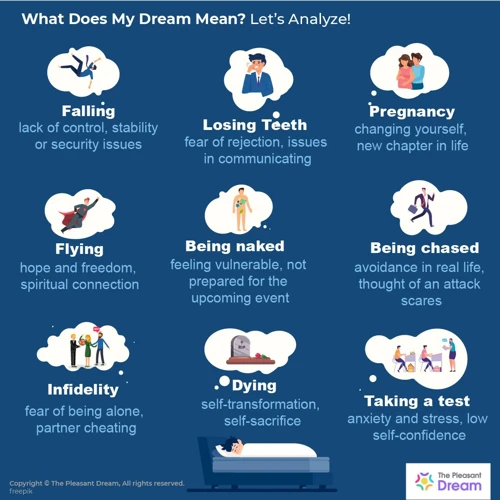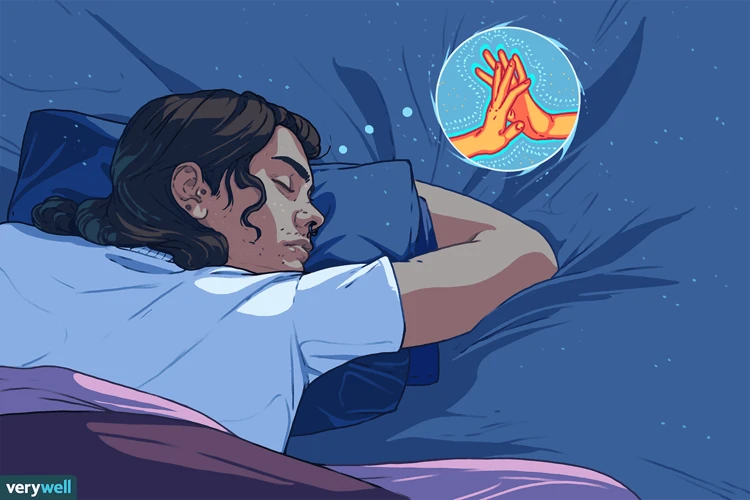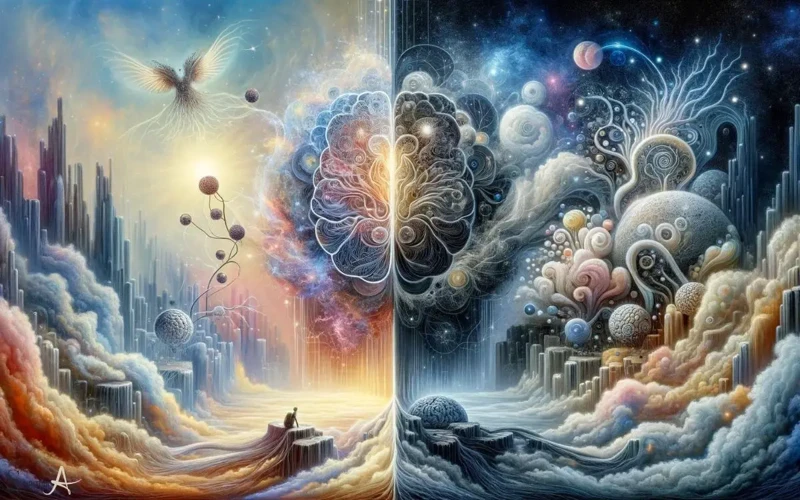Have you ever woken up from a dream and wondered what it meant? Dreams have long intrigued and perplexed us, providing a glimpse into our subconscious desires and fears. In this article, we delve deep into the realm of dreams, exploring their significance and unraveling the meaning behind our subconscious desires. Join us as we embark on a journey to understand the common themes in dreams, explore different types of dreams, discuss tools and techniques for dream interpretation, analyze the meaning of dreaming about others, interpret sexual dreams involving others, and dive into the influence of culture and symbolism in our dreams. Prepare to unravel the mysteries of your mind as we explore the fascinating world of dream interpretation.
Understanding Dreams and Their Significance

Understanding dreams and their significance is the key to unraveling the hidden messages within our subconscious minds. Dreams serve as a gateway to our deepest desires, fears, and emotions. They can provide insights into unresolved issues, help us process emotions, and offer guidance in our waking lives. Many theories exist about the purpose and meaning of dreams, with interpretations varying across cultures and individuals. While some view dreams as mere random firing of neurons during REM sleep, others believe they hold symbolic messages from the universe. Carl Jung, a renowned psychologist, introduced the concept of dream archetypes, suggesting that dreams tap into our collective unconscious. To truly understand the significance of our dreams, we must explore common themes, analyze symbols and archetypes, and reflect on our personal experiences and emotions. So, let’s embark on this fascinating journey as we navigate the depths of our dreams and decode their hidden meanings.
The Role of Dreams in Unveiling Subconscious Desires

The role of dreams in unveiling subconscious desires is a fascinating aspect of our psychological landscape. Dreams often act as a window into our deepest desires, allowing us to explore and confront our hidden thoughts and emotions. While we may not always remember our dreams, they serve as a conduit for unprocessed experiences, unresolved conflicts, and unexpressed emotions. Dreams can bring to light repressed memories, provide insights into our relationships, and offer creative solutions to life’s challenges. By analyzing the symbolism and themes present in our dreams, we can gain a deeper understanding of ourselves and our desires. Whether it’s dreaming about a person, a bear chasing us, or even having a dream about someone we know, each dream holds valuable clues about our subconscious desires. So, let’s dive into the realm of dreams and uncover the mysteries they hold.
Common Themes in Dreams

In the enigmatic realm of dreams, certain themes tend to recur, leaving us wondering about their significance. These common themes offer a glimpse into the inner workings of our subconscious minds. One such theme is the sensation of falling, where we plummet through the air with a sense of fear and unease. This dream often symbolizes a loss of control or instability in our waking lives. Another common theme is the act of flying, representing liberation, freedom, and the ability to rise above challenges. Being chased is yet another recurring theme, evoking feelings of anxiety and escape. This dream may reflect unresolved conflicts or a fear of confronting certain situations. Additionally, dreaming about being naked can signify vulnerability and a fear of being exposed. Lastly, the unsettling dream of missing teeth often signifies a fear of loss, change, or a lack of confidence. While these common themes provide a starting point, it’s essential to explore the specific context and personal emotions surrounding each dream to unravel their true meaning.
1. Falling
The theme of falling is a common occurrence in dreams and holds significant symbolic meaning. Dreaming about falling can evoke feelings of vulnerability, loss of control, or a fear of failure in our waking lives. While falling dreams may seem distressing, they often represent a deeper emotional or psychological state. Falling dreams can be a reflection of insecurities or a subconscious desire for liberation from stressors and restrictions. It’s important to reflect on the context and emotions surrounding the falling dream to gain a deeper understanding of its significance. If you’re interested in further exploring the interpretation of dreams about falling, you can check out this article about dreams involving a bear chasing you.
2. Flying
Flying is a common theme in dreams and holds various meanings. When we dream about flying, it often represents a sense of freedom and empowerment. It symbolizes a desire to rise above challenges and overcome obstacles in our lives. Flying dreams can also signify a need for escape or a longing for adventure and exploration. Additionally, flying dreams may reflect feelings of success, achievement, and the ability to conquer our fears. It’s important to consider the specific context and emotions associated with the dream to gain a deeper understanding of its significance. So, whether you find yourself soaring through the skies or struggling to stay afloat, pay attention to the details of your flying dreams for they may hold valuable insights into your subconscious desires and aspirations.
3. Being Chased
Being chased is a common theme in dreams that often evokes feelings of fear and anxiety. When we dream about being chased, it can symbolize a sense of vulnerability or the need to confront unresolved issues. The pursuer in our dreams may represent a person, situation, or emotions that we are trying to avoid or escape from in our waking lives. This dream could be a manifestation of stress, pressure, or a fear of failure. It’s essential to pay attention to who or what is chasing us in the dream, as it may provide valuable insights into the source of our anxiety or the challenges we need to confront. To dive deeper into the meaning behind being chased in dreams, check out our article on dreams involving other people.
4. Being Naked
Being naked is a common theme in dreams that can evoke feelings of vulnerability and exposure. Dreaming about being naked often symbolizes a fear of being judged or a desire for honesty and authenticity. It may reflect a sense of insecurity or a need to reveal your true self to others. This dream can also signal a need for liberation or a desire to let go of societal expectations and embrace your natural state. Analyzing the context and emotions surrounding the dream can provide further insights into its meaning. So, if you’ve had a dream about being naked, don’t be alarmed, it may simply be your subconscious mind urging you to embrace your true self and live authentically.
5. Missing Teeth
Missing teeth is a common and unsettling dream theme that can leave us feeling perplexed upon waking. Dreams about missing teeth often evoke feelings of vulnerability, insecurity, and loss. They can symbolize a fear of aging, a concern about appearance or attractiveness, or a sense of powerlessness in a particular situation. While the specific interpretation may vary based on personal experiences and emotions, there are some commonly suggested meanings. Some believe that dreaming of missing teeth could indicate feelings of regret or a fear of making a bad impression. Others relate it to issues related to communication or expressing oneself. To fully understand the significance of this dream, it is essential to reflect on personal experiences, emotions, and the context in which the dream occurs. So, if you’ve ever had a dream about missing teeth, you’re not alone. Dive into the exploration of dream analysis and discover the hidden meanings behind these intriguing dreams.
Exploring the Different Types of Dreams

Dreams come in various forms, each with its own unique characteristics and implications. By exploring the different types of dreams, we can gain a deeper understanding of our subconscious mind. One type of dream is the lucid dream, where the dreamer becomes aware that they are dreaming and can often control the dream’s narrative. Another type is the recurring dream, which occurs repeatedly and may signify unresolved issues or important messages. Nightmares, another type of dream, can evoke intense fear and anxiety, reflecting our deepest insecurities. Lastly, prophetic dreams are dreams that seem to predict future events, leaving us with an eerie sense of premonition. Each type of dream offers its own insights and is worth exploring on our quest to unravel the mysteries of our subconscious mind.
1. Lucid Dreams
Lucid dreams, a phenomenon where individuals become aware that they are dreaming while still in the dream state, offer a unique and exhilarating experience. In a lucid dream, the dreamer has the ability to consciously control their actions and surroundings, blurring the line between imagination and reality. This state of awareness opens up endless possibilities for exploration and self-discovery, allowing individuals to engage in activities they may not be able to in their waking life. Lucid dreaming has been a topic of interest and study for many psychologists and researchers who seek to understand the potential benefits and implications of this phenomenon. From enhancing creativity to overcoming fears and anxieties, lucid dreams can be a powerful tool for personal growth and self-realization. It is during these lucid dream states that individuals can truly tap into their subconscious desires and unleash their inner potential.
2. Recurring Dreams
Recurring dreams, the mysterious phenomenon of experiencing the same dream repeatedly, have long fascinated and puzzled dream researchers. These dreams can occur throughout one’s life and often leave a lasting impression. While their specific meaning may vary from person to person, recurring dreams tend to highlight unresolved issues, deeply rooted fears, or unresolved emotions. Whether it’s being late for an important event, being chased, or falling from a great height, these dreams can signify a need for attention or a desire for resolution. Exploring the symbols and emotions present in these recurring dreams can provide valuable insights into our subconscious minds. By recognizing patterns and analyzing the underlying themes, we can uncover the significance hidden within these repetitive dream experiences. So, if you find yourself caught in the web of recurring dreams, delve deeper and unravel the messages they hold, guiding you towards self-awareness and personal growth.
3. Nightmares
Nightmares are vivid, intense dreams that evoke strong feelings of fear, terror, or distress. They often involve threatening situations, such as being chased, attacked, or trapped. Nightmares can leave us feeling unsettled and anxious upon waking, with lingering emotions that can persist during the day. While the exact cause of nightmares is not fully understood, they are believed to be influenced by various factors, including stress, trauma, anxiety, and certain medications. Exploring the meaning behind nightmares can provide valuable insights into our subconscious fears and unresolved issues. Analyzing the symbols and emotions present in nightmares can help us confront and overcome these fears in our waking lives. Remember, nightmares are not omens of impending doom; rather, they are a window into our deepest anxieties and offer an opportunity for personal growth and healing.
4. Prophetic Dreams
Prophetic dreams, the stuff of legends and mysticism, hold a special place in our fascination with the unknown. These dreams are believed to provide glimpses into the future, offering insights or warnings about events yet to unfold. While the concept of prophetic dreams is often met with skepticism, many people claim to have experienced instances where their dreams seemed to foreshadow real-life events. In these dreams, details and symbols may emerge, later manifesting in waking life. Some individuals possess a natural ability to tap into this intuitive realm, while others may experience prophetic dreams sporadically. Exploring prophetic dreams involves deep introspection, reflection, and trusting one’s intuition. Keeping a dream journal and tracking patterns or recurring themes can help in identifying any prophetic elements in dreams. Although these dreams may be enigmatic and open to interpretation, they offer a mysterious glimpse into what may lie ahead.
Tools and Techniques for Dream Interpretation

Dream interpretation is a complex art that requires the use of various tools and techniques to unlock the meaning behind our subconscious visions. One effective tool is keeping a dream journal, where we record our dreams upon waking. This practice helps us remember the details and patterns in our dreams, aiding in analysis and interpretation. Another technique involves analyzing symbols and archetypes, as certain images in our dreams may hold significant meaning based on our personal experiences and cultural symbolism. Additionally, guided imagery and dream work can be powerful tools for deepening our understanding of dreams. Through methods like visualization and meditation, we can actively engage with our dreams, exploring their symbolism and extracting valuable insights. Utilizing these tools and techniques can lead to a greater understanding of our dreams and provide profound insights into our subconscious desires and fears.
1. Keeping a Dream Journal
Keeping a dream journal is a powerful tool for unlocking the mysteries of our dreams. By recording our dreams immediately upon waking, we capture the details and emotions that may otherwise fade away. A dream journal can be a simple notebook or a digital app—whichever format works best for you. Each entry should include a description of the dream, notable symbols or themes, and any emotions experienced during the dream. Regularly reviewing your dream journal allows you to identify patterns, recurring themes, and the evolution of your dreams over time. As you build a collection of dream entries, you may start to notice connections between your dreams and your waking life. Keeping a dream journal helps you develop a deeper understanding of your subconscious mind and promotes self-reflection. So, grab your pen or open your app, and start capturing the vivid world of your dreams.
2. Analyzing Symbols and Archetypes
Analyzing symbols and archetypes is an essential aspect of unlocking the meaning behind our dreams. Symbols and archetypes are recurring images or themes that carry universal meaning and symbolism. By identifying and interpreting these symbols, we can gain valuable insights into our subconscious desires and fears. Symbols can be personal and unique to individuals or have broader cultural significance. For example, dreaming about water may represent emotions, while a snake could symbolize transformation or healing. Archetypes, on the other hand, are deeply rooted in our collective unconscious and represent universal patterns and themes. Examples of archetypes include the hero, the mother, the wise old man, or the trickster. By analyzing symbols and archetypes in our dreams, we can unravel the layers of meaning embedded in our subconscious and gain a deeper understanding of ourselves and our experiences.
3. Using Guided Imagery and Dream Work
Using guided imagery and dream work is a powerful technique for delving deeper into the meanings behind our dreams. Guided imagery involves using visualization and imagination to access the subconscious mind and explore the symbols and messages within our dreams. This technique allows us to engage with our dreams on a more conscious level, enabling us to gain insights and clarity. Dream work involves actively exploring and analyzing our dreams through techniques such as journaling, discussing dreams with others, or consulting with a dream interpretation expert. These practices help us uncover patterns, symbols, and recurring themes in our dreams, providing valuable clues about our subconscious desires and emotions. By utilizing guided imagery and dream work, we can unlock the true significance of our dreams and harness their transformative potential.
Dreaming About Others: Unraveling the Meaning

Dreaming about others can often leave us with a sense of curiosity and intrigue. These dreams can feature a wide range of individuals, from romantic partners and love interests to family members, friends, co-workers, and even strangers or celebrity figures. Each person we dream about carries a unique significance and can offer valuable insights into our own psyche. When we dream about romantic partners or love interests, it may reflect our deep desires for connection, intimacy, or unresolved emotions within the relationship. Dreams involving family members and friends often tap into our emotional bonds, unresolved conflicts, or the need for support and connection. Dreaming about co-workers and colleagues may point to our professional aspirations, relationships dynamics, or unresolved issues within the workplace. As for dreams involving strangers and celebrity figures, they may symbolize certain qualities or characteristics that we admire or desire in ourselves or others. Exploring the meaning behind these dreams can provide us with a deeper understanding of our desires, emotions, and relationships in both our waking and dreaming lives.
1. Romantic Partners and Love Interests
Dreaming about romantic partners and love interests is a common and intriguing aspect of dream analysis. These dreams can evoke a wide range of emotions, from excitement to confusion. When we dream about someone we have feelings for, it often reflects our desires, hopes, and fears related to romantic relationships. The dream may symbolize our longing for connection, unresolved issues in the relationship, or even our subconscious exploration of what we desire in a partner. It is important to note that dreams about romantic partners and love interests do not necessarily predict future events or indicate specific intentions. They are a reflection of our innermost thoughts and emotions. So, dive into the mysterious realm of dreams about love and explore the hidden messages that your subconscious mind is trying to convey.
2. Family Members and Friends
Dreaming about family members and friends can hold significant meaning and insight into our relationships and emotional connections. Each person we encounter in our dreams may symbolize different aspects of ourselves or represent specific qualities or characteristics. The presence of family members in our dreams may evoke feelings of comfort, familiarity, or unresolved emotions. Dreaming about friends can reflect the bonds we share, the support we receive, or the conflicts we may be experiencing. Paying attention to the interactions, emotions, and events in these dreams can provide valuable insights into the dynamics of our relationships and our own personal growth. Whether it’s a joyful reunion, a conflict with a sibling, or a heartfelt conversation with a friend, exploring the symbolism and emotions within these dreams can help us better understand our connections and navigate the complexities of our waking relationships.
3. Co-workers and Colleagues
Dreaming about co-workers and colleagues is a common occurrence and can provide valuable insights into our professional lives and relationships. Seeing your co-workers or colleagues in a dream may reflect the dynamics of your working environment and your interactions with them. Pay attention to the nature of the dream and the emotions it evokes. Are you collaborating, competing, or having conflicts with them in the dream? Such dreams could indicate unresolved issues or tensions in your work relationships. It is essential to consider the specific details of the dream, such as the setting, actions, and conversations, to gain a deeper understanding of its meaning. Reflect on your waking life interactions with your co-workers and colleagues and see if there are any parallels or connections. Remember, dream interpretation is subjective, and it is crucial to trust your intuition and personal experiences when deciphering the symbolism behind dreaming about your co-workers and colleagues.
4. Strangers and Celebrity Figures
Dreaming about strangers and celebrity figures can be both intriguing and perplexing. These dreams often involve encounters with unfamiliar faces or well-known personalities that capture our attention. When we dream of strangers, it may reflect our subconscious mind’s exploration of new possibilities, unknown aspects of ourselves, or the emergence of repressed desires and fears. These dreams can also symbolize a longing for connection or a need for social interaction. On the other hand, dreams featuring celebrity figures may signify our fascination with fame, admiration for certain qualities embodied by the celebrity, or a desire to attain their level of success or recognition. Additionally, dreaming about celebrities can serve as a form of wish fulfillment or escapism, allowing us to experience a fantasy world where we interact with those we admire. Whether it’s encountering strangers or mingling with celebrities, these dreams offer a glimpse into our subconscious thoughts and desires, inviting us to delve deeper into their symbolic meanings and personal significance.
Interpreting Sexual Dreams Involving Others

Interpreting sexual dreams involving others can be a complex and sensitive task. It’s important to approach these dreams with an open mind and without judgment. Sexual dreams involving someone other than your romantic partner or love interest do not necessarily indicate infidelity or hidden desires. They often symbolize aspects of ourselves or our relationships that we need to explore or understand better. It’s crucial to analyze the emotions and context of the dream rather than taking the imagery literally. Factors like the relationship with the person involved, the emotions felt during the dream, and the overall theme can provide clues to decipher the underlying message. Engaging in self-reflection, exploring any unresolved desires or emotions within ourselves, and communicating openly with partners can help in understanding these dreams on a deeper level. Remember, the interpretation of sexual dreams involving others is subjective, and it’s essential to trust your instincts and intuition when seeking their meaning.
The Power of Dream Analysis and Self-Reflection

The power of dream analysis and self-reflection lies in their ability to unveil the hidden aspects of our subconscious minds and provide valuable insights into our inner world. By examining the symbols, emotions, and narratives within our dreams, we can gain a deeper understanding of ourselves and our desires. Dream analysis involves exploring the various elements of a dream, such as people, objects, and actions, and interpreting their significance in relation to our waking lives. This process allows us to uncover patterns, identify unresolved issues, and tap into our intuition. Additionally, self-reflection plays a crucial role in understanding our dreams, as it requires us to honestly analyze our thoughts, feelings, and experiences. Through introspection, we can connect the dots between our dreams and our waking reality, uncovering hidden truths and gaining clarity. Dream analysis and self-reflection work hand in hand, providing us with a powerful tool for personal growth and self-discovery. So, let us delve into the depths of our dreams and harness their transformative potential.
The Influence of Culture and Symbolism in Dreams
The influence of culture and symbolism in dreams cannot be underestimated. Our dreams are deeply intertwined with our cultural beliefs, traditions, and experiences. Different cultures may interpret the same dream symbol differently, adding layers of complexity to dream analysis. Symbols in dreams can draw upon cultural archetypes, religious symbols, and societal norms. For example, in Western cultures, dreaming of a wedding may symbolize union and commitment, while in some Eastern cultures, it may signify death or the end of a relationship. Additionally, personal experiences and individual interpretation also play a significant role in dream symbolism. To fully understand the meaning of our dreams, it is crucial to consider both cultural influences and personal symbolism. So let’s delve into the rich tapestry of cultural influences and symbolism that shape our dreams and gain a deeper understanding of ourselves in the process.
Conclusion
In conclusion, dreams hold immense significance in unraveling the depths of our subconscious desires. They provide a window into our innermost thoughts, fears, and aspirations. By understanding and interpreting our dreams, we can gain valuable insights, find resolutions to conflicts, and embark on a journey of self-discovery. Dream interpretation is a personal and unique process, influenced by our cultural background, personal experiences, and individual symbolism. Through keeping dream journals, analyzing symbols and archetypes, and utilizing techniques like guided imagery, we can unlock the hidden messages within our dreams and use them as tools for personal growth and self-reflection. So, next time you find yourself immersed in a vivid dream, remember to contemplate its meaning and dive into the rich tapestry of your own subconscious mind. Sweet dreams and happy exploring!
Frequently Asked Questions
1. Can dreams predict the future?
While some people claim to have had prophetic dreams, there is no scientific evidence to support the idea that dreams can predict the future. Dreams are often a reflection of our thoughts, emotions, and experiences, rather than glimpses into forthcoming events.
2. Why do we forget our dreams?
Forgetting dreams is a common occurrence due to the brain’s complex processes of memory consolidation. Dreams are stored in short-term memory, and if not rehearsed or actively processed, they can easily fade away as we wake up and shift our focus to daily activities.
3. What causes nightmares?
Nightmares can be triggered by a variety of factors, such as stress, trauma, anxiety, medication, sleep disorders, or even certain foods. They often serve as a reflection of our fears and unresolved issues, providing an opportunity for us to confront and process them.
4. Can dreams help us solve problems?
Yes, dreams can provide valuable insights and assist in problem-solving. Sometimes, the subconscious mind continues to work on unresolved issues during sleep, offering fresh perspectives and creative solutions. Keeping a dream journal and reflecting on dreams can aid in harnessing their problem-solving potential.
5. Do men and women dream differently?
While men and women may experience different dream themes and content, there is no conclusive evidence to suggest that they dream differently overall. Dream experiences are highly subjective and influenced by individual experiences, emotions, and beliefs.
6. Why do recurring dreams happen?
Recurring dreams often indicate unresolved emotional issues or recurring patterns in our lives. They can serve as reminders to address these underlying concerns and make positive changes. Paying attention to recurring dreams can offer valuable insights into areas that require our attention.
7. Is it possible to control our dreams?
Yes, it is possible to develop the skill of lucid dreaming, where the dreamer becomes aware that they are dreaming and can exert some control over the dream content. Techniques such as reality checks, dream journaling, and visualization exercises can aid in achieving lucidity during dreams.
8. What is the purpose of nightmares?
Nightmares serve various purposes, including processing emotions, confronting fears, and highlighting areas in need of attention. They can act as wake-up calls to address underlying issues, potentially leading to personal growth and transformation.
9. Can dreams reflect our hidden desires?
Yes, dreams often tap into our hidden desires, providing a safe space for exploring fantasies and suppressed emotions. They can bring forward our deepest longings and shed light on our subconscious desires, helping us gain a better understanding of ourselves.
10. Can dreams be influenced by external factors?
Absolutely. External factors such as daily experiences, media consumption, and personal interactions can influence dream content. The mind incorporates these inputs during sleep, resulting in dreams that may mirror real-life situations or reflect external influences in symbolic ways.







